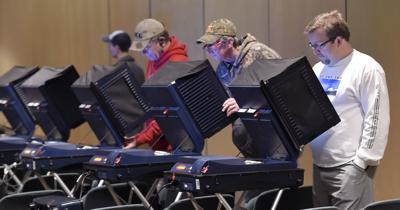Afraid of locking people out of the voting process when Louisianaâs begin next spring, lawmakers and state officials are reworking how voters register for a political party â including abolishing the Independent Party altogether.
For years, some Louisianans who don't identify as Republican or Democrat signed up to vote as "Independent," in some cases thinking they were registering unaffiliated with a party. But in fact they were registering as members of the Independent Party of Louisiana.
That didn't matter much previously, because Louisiana has had open primary elections where anybody can vote for any candidate regardless of party affiliation. But the state's recent switch to closed primaries for several major races means that voters registered as Independent will be locked out of some votes.
So now a proposal making its way through the Louisiana Legislature would eliminate the Independent Party and move those voters to unaffiliated âno partyâ registrations instead.
There are currently 149,464 voters registered as Independent, according to Louisiana Secretary of State data.
Under the new rules established last year for closed party primary races, voters registered as Republican must vote in the Republican Party primary and voters registered as Democrat must vote in the Democratic Party primary. Unaffiliated voters who check the box to register as âno partyâ can choose to vote in either the Democratic or Republican closed primary.
But voters registered as members of the Green, Independent or Libertarian parties cannot vote for candidates running in Aprilâs closed party primary races.
Those include contests for one U.S. Senate seat, all six Louisiana seats in the U.S. House of Representatives, two state Supreme Court seats, and two spots on the Public Service Commission.
Independent Party of Louisiana Executive Director William Bryan endorsed the dissolution of his party, calling it an âact of fairness.â
âWeâre in support of this bill so that these voters are eligible to vote,â he told a panel of House lawmakers Wednesday.
, sponsored by Rep. Beth Billings, R-Destrehan, would bar a political party in Louisiana from calling itself âIndependent Partyâ or âIndependent,â a prohibition that was in place prior to 2014. And voters being switched from Independent to "no party" registrations would be notified by the Secretary of Stateâs office of the change in status.
The bill would also create a formal mechanism for a recognized political party to voluntarily dissolve.
Bryan said many voters registered as Independent before the closed party primary system became law, âand itâs through no fault of their own that they wonât be able to vote in this upcoming election.â
âRather than 150,000 Louisianians not being able to vote, I think itâs only fair that we just go ahead and support this bill,â he said. âThe best we can do is try to limit the damage to ⦠the people who are going to have their right to vote restricted.â
Louisiana Secretary of State Nancy Landry on Wednesday told lawmakers that many voters who registered as Independent âdo not realize that they are members of a party,â and the previous prohibition on the political party name âIndependent Partyâ was in place âbecause of the confusion that it caused for voters.â
âWith the closed party primaries starting next year, weâre concerned about those voters being confused,â she said. âThis bill would dissolve the Independent Party, prohibit future parties to be named Independent Party because of that confusion, and move all of the Independent Partyâs current members into âno party,â which is an unaffiliated status which will allow them to vote in the closed party primaries in 2026.â
Elections in Louisiana
Louisiana has roughly 2.9 million registered voters.
Of those, roughly 657,000 are unaffiliated voters registered as âno party.â About 15,000 are registered as members of the Libertarian Party and 2,800 are registered with the Green Party.
There are roughly 1.05 million registered Republicans and 1.1 million registered Democrats.
Last year lawmakers passed two laws setting up a new system for primary elections for a select number of offices: U.S. House and Senate, state Supreme Court, Louisiana Public Service Commission and Board of Elementary and Secondary Education.
Only the Republican and Democratic parties can hold primary elections for these races under the new rules.
Thatâs because, just for the purposes of closed party primary races, only political parties that have received at least 5% of the vote in an election for statewide office or in the last presidential election can hold closed primary elections in Louisiana.
Candidates who want to run in these races not as a Republican or a Democrat can only run in the fall general election. And in order to qualify for the election, these candidates can only do so by collecting the required number of voter signatures through the nominating petition process.
For example, congressional candidates must collect 5,000 signatures and state Supreme Court candidates must collect 1,000 signatures.
For the vast majority of races, however, candidates have the choice to qualify via the signature-gathering process or by paying a fee and submitting straightforward paperwork to election officials.
The new closed party primary limits are a significant change from Louisianaâs open primary system â often referred to as a jungle primary â in which nearly anyone affiliated with any party can run in a primary race.
This yearâs HB420 would also raise the bar to become an officially recognized political party in Louisiana.
The fee would increase from $1,000 to $5,000 and at least 5,000 voters would need to register as a member of the party, up from 1,000 voters.

